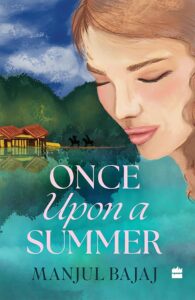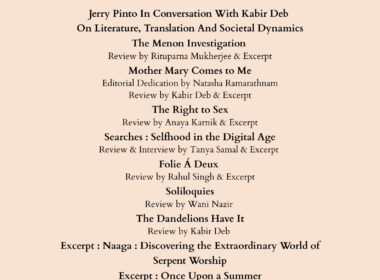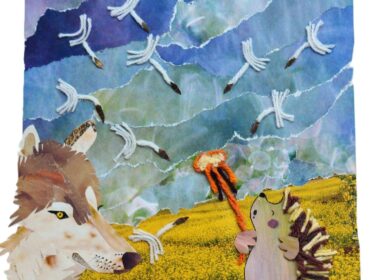Excerpt Once Upon a Summer

Image courtesy of HarperCollins Publishers India
MUCH TO HER delight, Madeline’s riding habit had the desired effect. It enabled her to ride astride Papa’s horse and gave her courage to canter at a ripping good speed along thandi-sarak. She imagined she saw more than one envious glance directed at her from the two other women riding side-saddle on the road that morning.
It was good to have a mother like Martha, who encouraged her to look at comfort and practicality first when it came to dressing. Mamma had no patience with trailing long skirts, tight corsets and dresses that constricted a woman’s body or restricted her movements unnecessarily.
She stole a few sidelong glances at Azeem—whose name she had learnt from her father—walking by her side. Her heart had lurched momentarily this morning as he had walked towards her and given her charge of the horse’s reins. She noticed that he had artistic-looking hands with long tapering fingers, nails neatly clipped and clean.
‘What is his name?’ she asked, looking towards the horse, taking special care to make her Hindustani sound dulcet. She saw the syce’s eyes flicker for a second, surprised at her use of Hindustani.
‘Steel,’ he replied. He continued to stare ahead at the road. They were returning to the lodge.
She felt strangely chagrined at the horse’s name. Steel was so prosaic. It must be the colour, she concluded. He was a beautiful grey with a swishing black tail.
‘Just stay here for a moment while I go in and fetch him a lump of sugar. He’s been most well-behaved. He should get a reward,’ she said, as she got off the horse and let Azeem take charge of him.
The horse nibbled at the sugar and looked up at her with limpid eyes, imploring her for more. After giving him a second lump, she gently stroked his neck with her fingers and he nuzzled her, leaning towards her trustingly. They were going to get along, she could tell.
‘How beautiful you are, Steel. I hope we can be friends from today,’ she said, turning her head from the horse to the groom before going in. She had pronounced khoobsurat exactly as the librarian at Jaunpur had taught her. If Azeem noticed her superior diction, his face betrayed no signs of it.
Her parents were already having their breakfast.
‘Did you have a good ride?’ asked Norman. ‘You look all flushed.’
‘It was wonderful. I could gallop freely all the way from the lower stands to the upper end of the lake without any need to rein the horse in,’ she said, hanging up her bonnet on the hook near the umbrella stand in the veranda and sitting down at the breakfast table laid out outdoors. It was covered with a tablecloth—a bright yellow and green flowered print on a dull ivory backdrop.
She finished her cornflakes and reached out for the toast. She began to butter it.
Perhaps she could tuck in an omelette too. Riding made her ravenous.
‘Some jam?’ asked Norman, pushing three little jars, set on a small wooden tray, towards her. Plum. Peach. Apricot. All made by Mrs Croft’s cook. There were many fruit trees on the estate.
‘What are your plans for the day, Madeline? I have promised Mrs Burke that I will spend a few hours at the library today helping the new librarian understand the Dewey system better. Papa is going to be busy meeting members of the municipal board, and then he and I are lunching together at the clubhouse. Would you like to join us for lunch?’ asked Martha.
‘I think I’ll stay in and write back to Rose. She waits for my letters as eagerly as I await hers. There is so much to tell her since my last letter. I’ll call a lunch tray up to my room.’
‘Are you sure, my dear?’ asked Martha. It was unusual for Madeline to wish to spend a bright, sunny morning alone in her room. ‘Convey my regards to Rose. I’m really glad to hear that her uncle’s school is finally off to a start with its first pupils enrolled.’
‘I will, Mamma. You enjoy your outing. I may go walking with Mariam to post the letter once I’m finished.’
‘Sounds like everyone is set for the day then,’ smiled Martha. ‘I’m looking forward to doing some useful work for a change.’
‘I thought you liked being here, dear,’ said Norman, with his lopsided, endearing smile, a searching look in his brown eyes.
‘I do. I shall like it even more for being engaged at a task which needs doing,’ replied Martha with a laugh. ‘You know indolence doesn’t become me. I am much happier playing worker-bee than butterfly.’
Norman smiled back at his wife. Happiness transfigured her face, made her seem gentler. When had Martha become such a serious, solemn woman? Perhaps she had always been so in essence. Youth casts its own veneer of joy on a face; time peels it off year by year.
Alone in her room, Madeline settled down to write to Rose. After a few falsely bright sentences describing the new friends she had made in her skating class, she gave up with a sigh. She needed to confront the elephant in the room before she could write a single truthful, coherent sentence again. She needed to confront the confused feelings her father’s syce stirred in her. A strange longing to speak to him, an urgent desire to know him better coursed through her.
If only Rose were here. It was impossible to write to her about Azeem without causing alarm. She pushed the letter pad away and exhaled deeply. Madeline would need to talk to Madeline, after all. As a single child, she had much practice being her own chief confidante, having extended conversations with the girl in her mirror. She had grown out of speaking to her over the years. But today, she needed her back, that friend of her childhood fantasy, the alter ego who was able to see things differently, give consolation and counsel as needed.
‘It’s alright, Madeline. You’re just a friendly person. It’s quite simple, really. You like knowing people. You talk to Mariam, to Gobind, to Abdul, to Ram Deen, to the boatmen, to everyone. So why not Azeem?’ she said aloud to herself.
Azeem. She said the name aloud a few times, just to make sure it would flow mellifluously off her tongue when she addressed him the next morning. There was no use pretending to herself that he was no different from Gobind or Abdul or the pankha boys or the dhobi with his donkey.
‘Remember, you are talking to yourself. There is no point to this conversation unless you are truthful,’ she chided herself.
Something was happening to her, something unfamiliar and unsettling. It wasn’t just that she was acutely aware of Azeem, sensing his presence in the vicinity even before she saw him, picking up the sound of his footsteps distinct from all others as he crossed the compound, her nostrils quivering as the scent of him,
woody and pine fresh, reached her. She had become extremely aware of herself, constantly seeing her person through his eyes, conscious of every aspect of her appearance and speech, imagining how she must look and sound to him.
This was sheer madness, this edge of excitement she was walking on, her sense of self all tremulous and uncertain. It was best if she stayed away from the syce. She could always resume riding lessons once she returned to Jaunpur. She must nip this unseemly attraction in the bud.
‘Madeline Evans, if you saw a beautiful mountain view, would you not admire it? If you smelt an alluring perfume, would you not want to know its source? If you found a poem that spoke to your soul, would you not memorize it by heart, and repeat it to yourself again and again? When you tasted a mango for the first time, didn’t you let its sweet juices fill up your mouth? You didn’t ask yourself to spit it out! Why then are you hiding in your room and deciding that you will never go near Azeem again?’
Excerpted with permission from Once Upon a Summer by Manjul Bajaj published by HarperCollins Publishers India 2025.
Manjul Bajaj grew up in Lucknow. She graduated in economics from Delhi University and then did a master’s degree in rural management and another in environmental science. She worked in the field of environment and rural development before she became a writer. She is the author of Come, Before Evening Falls (2010), Another Man’s Wife (2012), In Search of Heer (2019), The Book of Bullah (2024) and The Songs of Meera (forthcoming). She has also written two books for children—Elbie’s Quest (2013) and Nargisa’s Adventures (2016). Manjul’s work has been shortlisted for various literary prizes over the years. She currently lives in Goa with her husband, her two sons having flown the nest.

Image Source : https://anuradhagoyal.com/manjul-bajaj/




